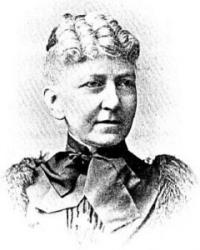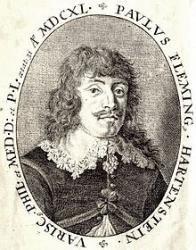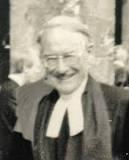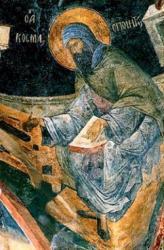Planning worship?
Check out our sister site, ZeteoSearch.org,
for 20+ additional resources related to your search.
- |
User Links
Person Results
Ernest R. Kroeger

1862 - 1934 Person Name: Ernest R. Kroeger, 1862-1934 Meter: 8.8.6.8.8.6 Composer of "JOSEPHINE" in Christian Worship Born: August 10, 1862, St. Louis, Missouri.
Died: April 7, 1934, St. Louis, Missouri.
Buried: Bellefontaine Cemetery, St. Louis, Missouri.
Kroeger was a charter member of the American Guild of Organists; member the National Institute of Arts of Letters; conductor of the Amphion Male Chorus in St. Louis (1883-84); organist at the Unitarian Church of the Messiah, St. Louis (1886); director of the College of Music at Forest Park University (1887); president of the Music Teachers’ National Association (1896-97); president of the Missouri State Music Teachers’ Association (1897-99); instrumental adjudicator at the annual Kansas Jubilee (1900-03); master of programs in the Bureau of Music at the St. Louis World’s Fair, 1904; adjudicator at the Welsh Eisteddfod in Canton, Ohio (1906); and director of the music department at Washington University, St. Louis (1925-34). He also ran the Kroeger School of Music in St. Louis (1904-34).
--www.hymntime.com/tch/
============
Successful American composer and teacher; born at St. Louis, Mo. He began studying violin and piano when he was five years old, and received his entire musical education in this country, principally in St. Louis, where he is located at present, and holds a prominent position as a teacher, pianist and composer. He is director of the College of Music at the Forest Park University for Women and is concert pianist of the Kroeger School of Music. Was president of the Music Teachers' National Association from 1895 to 1896, and of the Missouri State Music Teachers' Association from 1897 to 1899. Is a fellow of the American Guild of Organists and was master of programs of the Bureau of Music at the St. Louis Exposition in 1904. He has written a great many different kinds of music, and is one of a very few Americans who have published fugues. Mr. Kroeger says that some of his ideas are entirely musical, while others are attempts to illustrate poems in tones, such as his symphony, a suite, and overtures on Endymion, Thanatopis, Sardanapalus and Hiawatha. He has also published a very clever group of sonnets, on various themes; Twelve Concert Studies, which Hughes says "show the influence of Chopin upon a composer who writes with a strong German accent;" an etude, Castor and Pollux; a Romanze; and other studies. A Danse Negre and Caprice Negre resemble similar works of Gottschalk; and his Dance of the Elves is dedicated to Mme. Rive-King.
--grandemusica.net/musical-biographies
Ernest R. Kroeger
Harriet M. Kimball

1834 - 1917 Meter: 8.8.6.8.8.6 Author of "Peace And Good Will" in The Cyber Hymnal Kimball, Harriet McEwan, a native and resident of Portsmouth, Newhaven, is the author of Hymns, Boston, 1866; Swallow Flights of Song, 1874, &c. Her hymns include:—
1. At times on Tabor's height. Faith and Joy
2. Dear Lord, to Thee alone. Lent.
3. It is an easy thing to say. Humble Service.
4. We have no tears Thou wilt not dry. Affliction. Appeared in the Poets of Portsmouth, 1864, and the Unitarian Hymns of the Spirit, 1864, and others. In Miss Kimball's Hymns, 1866, this hymn begins with stanza iii. of "Jesus the Ladder of my faith."
Several of Miss Kimball's poems were included in Baynes's Illustrated Book of Sacred Poems, 1867. [Rev. F. M. Bird, M.A.]
--John Julian, Dictionary of Hymnology (1907)
===================
Kimball, Harriet M., p. 624, ii., b. Nov. 2, 1834, and a Roman Catholic. From her hymn, "Jesus, the Ladder of my faith," p. 624, iii. 3, another cento, beginning "Sweeter to Jesus when on earth/* is taken. It is in The Pilgrim Hymnal, 1904.
--John Julian, Dictionary of Hymnology, New Supplement (1907)
Harriet M. Kimball
Charles E. Kettle
1833 - 1895 Meter: 8.8.6.8.8.6 Composer of "STOURBRIDGE (Kettle)" Charles Edward Kettle, 1833-1895
Born: 1833, Bury St. Edmunds, Suffolk, England.
Died: Circa February 1895, Steyning district, Sussex, England.
As of 1881, Kettle lived in Hove, Sussex, where he was an organist.
--www.hymntime.com/tch
Charles E. Kettle
Johann Gottfried Schicht

1753 - 1823 Person Name: J. G. Schicht (1753-1823) Meter: 8.8.6.8.8.6 Composer (Melody, and most of the harmony) of "MANNA" in Hymns for Celebration Johann Gottfried Schicht
Born: September 29, 1753 - Reichenau, Zittau, Germany
Died: February 16, 1823 - Leipzig, Germany
Johann Gottfried Schicht
James Merrick
1720 - 1769 Meter: 8.8.6.8.8.6 Author of "All glory to the eternal Three! Thee, Father, thee, O Son, and thee" Merrick, James , M.A., was born in 1720, and educated at Oxford, where he became a Fellow of Trinity College. He entered Holy Orders, but his health would not admit of parish work. He died at Reading, 1769. His publications include:—
(1) Messiah, a Divine Essay. Humbly dedicated to the Reverend the Vice-Chancellor of the University of Oxford and the Visitors of the Free School in Reading. By James Merrick, Ætat. 14, Senior Scholar of the School at their last Terminal Visitation, the 7th of October, 1734. Reading. (2) The Destruction of Troy. Translated from the Greek of Tryphiodorus into English Verse, with Notes, &c. 1742. (3) Poems on Sacred Subjects. Oxford . 1763. (4) The Psalms of David Translated or Paraphrased in English Verse. By James Merrick, M.A., late Fellow of Trinity College, Oxford. Reading. J. Carnan and Co. 1765. 2nd ed. 1766. A few only of these paraphrases were divided into stanzas. In 1797 the Rev. W. D. Tattersall pulished the work "Divided into stanzas for Parochial Use, and paraphrased in such language as will be intelligible to every capacity . . . with a suitable Collect to each Psalm from the Works of Archbishop Parker."
Merrick's paraphrases, although weak and verbose, were in extensive use in the early part of the present century, both in the Church of England and with Nonconformists. They have, however, fallen very much into disuse. Those in modern hymn-books, mainly in the form of centos, include:—
1. Blest Instructor, from Thy ways. Ps. xix.
2. Descend, O Lord! from heaven descend. Ps. cxliv. (In time of National Peril.)
3. Far as creation's bounds extend. Ps. cxlv.
4. God of my strength, the wise, the just. Ps. xxxi.
5. He who with generous pity glows. Ps. xli.
6. How pleasant, Lord.Thy dwellings are. Ps. lxxxiv.
7. Lift up your voice and thankful sing. Ps. cxxxvi.
8. Lo, my Shepherd's hand divine. Ps. xxiii.
9. Lord, my Strength, to Thee I pray. Ps. xxviii.
10. My heart its noblest theme has found. Ps.xlv.
11. O let me, [gracious] heavenly Lord extend. Ps. xxxix.
12. O turn, great Ruler of the skies. Ps. li.
13. Praise, O praise the Name divine. Ps. cl.
14. Sing, ye sons of [men] might, O sing. Ps. xxix.
15. Teach me, O teach me, Lord, Thy way. Ps. cxix.
16. The festal morn, my [O] God, is come. Ps. cxxii, (Sunday Morning.)
17. The morn and eve Thy praise resound. Ps. lxv. (Harvest.)
18. To Thy pastures, fair and large. Ps. xxiii.
From his Poems on Sacred Subjects, 1763, the following centos have also come into common use: --
19. Author of good, to Thee we turn. Resignation.
20. Eternal God, we look to Thee. Resignation.
21. 'Tis enough, the hour is come. Nunc Dimittis.
John Julian, Dictionary of Hymnology (1907)
James Merrick
Paul Flemming

1609 - 1640 Person Name: Paul Flemming, 1609-40 Meter: 8.8.6.8.8.6 Author of "In all my ways, in every task" in Together in Song Flemming, Paul , son of Abraham Flemming or Fleming, then schoolmaster at Hartenstein, near Zwickau, Saxony (afterwards pastor of Wechselburg, near Mittweida), was born at Hartenstein, Oct. 5 or 12, 1609. He entered the St. Thomas School, Leipzig, in 1623, and matriculated at the University of Leipzig at Michaelmas, 1626, At the University he devoted himself to the study of medicine and of poetry, being laureated as a poet in 1631, and graduating M.A. in 1632. In order to find refuge from the troubles of the Thirty Years' War he went to Holstein in 1633. In the same year he joined an embassy which Duke Friedrich of Schleswig-Holstein was about to send to his brother-in-law, the Russian Czar, as gentleman in waiting and "taster." In this expedition he was engaged from Oct. 22, 1633, to April 6, 1635. He then took part in the embassy sent by the Duke to the Shah of Persia, with the object of opening up the way for trade and Christianity into Central Asia. They set sail from Travemünde, near Lübeck, Oct. 27, 1635, and returned to Gottorf, Aug. 1, 1639. The expedition proved fruitless, and the many dangers and great hardships encountered broke Flemming's health. To qualify himself for medical practice in Hamburg he went to the University of Leyden, where he graduated M.D. in 1640; but shortly after his return to Hamburg he died there, March 25 (April 2), 1640 (Koch, iii. 73-82; Allgemeine Deutsche Biographie, vii. 115-117).
Flemming was of an energetic temperament, with an ardent patriotism, and a deep love for the Evangelical Cause. He was a gifted poet, of true and deep feeling, who could write charming descriptions of the beauties of nature, and sweet and tender love songs. His secular poems, however, as a whole have the faults of the Silesian school of Martin Opitz; and it is by his hymns, and especially by his classical "In allen meinen Thaten," that his name lives.
His poems were first collected by the father of his betrothed as D. P. Fleming's Teutsche Poemata, and appeared in 1642 in two editions nearly alike, one at Naumburg and Jena, the other at Lübeck. The most complete edition is that by J. M. Lappenberg, 2 vols., Stuttgart, 1865-66. Of his 41 religious poems (12 hymns, 9 odes, 20 sonnets) three have passed into English.
i. In alien meinen Thaten . Trust in God. This beautiful hymn was written in November, 1633, just before he started with the embassy to Moscow (see above); and may often have cheered his own sinking spirit then and in the more trying adventures of the second embassy. It first appeared in his Teutsche Poemata , 1642 (Lübeck edition, p. 287; Lappenberg's edition, i. p. 236), as No. 4 in Book i. of the Odes, in 15 stanza of 6 1. It was included in the Stralsund Gesang-Buch, 1665, Freylinghausen's Gesang-Buch , 1704, and almost all recent collections. Sometimes, as in the Unverfalschter Liedersegen, 1851, No. 646, it is given in full, but more frequently the special stanzas appropriate for travellers (vi.-ix., xiii., xiv.) are omitted. It is characterised in Koch, viii. 379, as a "pilgrim song suited for the Christian journey which we must all in faith make through joy and sorrow to our Eternal Home." Lauxmann adds that it has often been used appropriately at weddings, was the favourite hymn of Friedrich Wilhelm III. of Prussia, and was sung at the service in the Cathedral of Berlin, July 19, 1870, on the open¬ing of the North German Diet immediately before the Franco-Prussian War. Translated as:—
I leave to His good pleasure , a translation of st. i., ii., iv, by A. T. Russell, as No. 232 in his Psalms & Hymns , 1851.
Other translations are : (l) “In all my plans, Thou Highest," by Dr. H. Mills, 1856, p. 167. (2) “Where'er I go, whate'er my task," by Miss Winkworth, 1858, p. 108, repeated in L. Rehfuess's Church at Sea , 1868, p. 9. (3) "In every deed and word," in Madame de Pontes's Poets & Poetry of Germany, 1858, vol. i. p. 416.
His hymns not in English common use are:—
ii. Ist's mőglich, dass der Haas auch kann geliebet sein. The Love of God. In the Lübeck edition, 1642, p. 555 (Lappenberg's edition, i. p. 450), as No. 16 in Book i. of the Sonnets . Translated as, "Can it then be that hate should e'er be loved," by Miss Winkworth, 1869, p. 175.
iii. Lass dich nur Nights nicht tauren. Cross and Consolation. Probably written in Persia during the second embassy. In the Lübeck edition, 1642, p. 283 (Lappenberg's edition, i. p. 244), as No. 1 in Book i. of the Odes, in 3 st. of 6 l.
The translations are:
(1) "Only let nothing grieve thee," by Madame de Ponies, 1858, v. i. p. 415. (2) "Let nothing make thee sad or fretful," by Miss Winkworth, 1869, p. 175.
[Rev. James Mearns, M.A.]
- John Julian, Dictionary of Hymnology (1907)
Paul Flemming
Edward Bunnett
1834 - 1923 Person Name: E. Bunnett Meter: 8.8.6.8.8.6 Composer of "RANSOM" in The Church Hymnal Edward Bunnet Canada 1834-1923. Born at Shipdham and educated at Norwich Cathedral Choir School, he was a talented chorister, composer, a brilliant organist, and had a sharp sense of humour. He married Emma Elizabeth McGowan in 1890, and they had three children. He became assistant organist at Norwich Cathedral for 22 years and later at St. Peter Mancroft, Norwich, for another 31 years. He was organist for the Norwich triennial Musical Festival for 33 years. Over his life he taught thousands of young people how to play the organ. He composed 16 choral works.
John Perry
Edward Bunnett
Harriet Reynolds Krauth Spaeth
1845 - 1925 Person Name: Harriet Reynolds Krauth Meter: 8.8.6.8.8.6 Composer of "ST. SIMEON" Harriet Reynolds Krauth Spaeth [Harriet Krauth], 1845-1925
Born: September 21, 1845, Baltimore, Maryland.
Died: May 5, 1925, Philadelphia, Pennsylvania.
Buried: Mount Vernon Cemetery, Philadelphia, Pennsylvania.
Daughter of hymn translator Charles Krauth, Harriet attended the Girls’ School in Philadelphia, and lived independently as a writer. In 1880, she married Adolph Spaeth, pastor of St. Johannis Church in Philadelphia (and later president of the General Council of the Lutheran Church in America). She sang contralto, played the piano and organ, and for many years was the organist at St. Stephen’s Church in west Philadelphia. She provided hymn translations for The Church Book (1868), The Sunday School Hymnal (1901), and was responsible for the music edition of The Church Book (1872). Many of her essays were published in The Lutheran. When American Lutherans adopted the Common Service in 1888, she prepared an edition with notes for chanting the service. She worked zealously for the founding of the Krauth Memorial Library at the seminary in Philadelphia, and was active in the work of the Mary J. Drexel Home, the Lankenau Hospital, and the Lutheran Orphans’ Home in Germantown, Pennsylvania. Her works include:
The Deaconess and Her Works
Pictures from the Life of Hans Sachs
The Church Book with Music, 1893
Charles Porterfield Krauth: A Life (2 volumes, 1898 & 1909, with Adolph Spaeth, uncredited)
Life of Adolph Spaeth, 1916
© The Cyber Hymnal™ (www.hymntime.com/tch)
Harriet Reynolds Krauth Spaeth
George Bradford Caird

1917 - 1984 Person Name: George B. Caird, 1917-1984 Meter: 8.8.6.8.8.6 Author of "Not far beyond the sea, nor high" in The Hymnal 1982 George Bradford Caird (17 July 1917 – 21 April 1984), D.Phil., D.D., FBA, was a British churchman, theologian, humanitarian, and biblical scholar. At the time of his death he was Dean Ireland's Professor of the Exegesis of Holy Scripture at the University of Oxford.
Born in London, England to parents from Dundee, Scotland, George Caird's early years were spent in Birmingham, England, where his father was a construction engineer, and where he attended King Edward's School. His university education began at Peterhouse, Cambridge, where he received the B.A. in 1939, First-Class Honours in both parts of the Classical Tripos, with distinction in Greek and Latin verse. A lifelong Congregationalist, he then left Cambridge to study theology at Mansfield College, Oxford, and acquired the Oxford M.A., First-Class Honours, in 1943. In 1944 he was granted the Oxford D.Phil. for his thesis "The New Testament Conception of Doxa (Glory)".
After serving three years as a pastor in Highgate, London, in 1946 Caird and his young bride, Viola Mary Newport, known to all as "Mollie," pulled up stakes and left for Canada. Virtually fluent in ancient Hebrew, there he was quickly made Professor of Old Testament at St. Stephen's College, Edmonton, Alberta, and later (simultaneously) Professor of New Testament at McGill University and Principal of the United Theological College of Montreal.
In 1959 Caird returned to Oxford and the Congregationalist stronghold of Mansfield College, where he was first Senior Tutor (under John Marsh) and later Principal (1970–1977). Because he was non-Church of England, and because Mansfield was still a Permanent Private Hall and had not yet achieved status as a constituent College of the University (see Colleges of the University of Oxford) during this period (1969–1977), Caird was barred from holding an official university lectureship. However, as a compensation he was granted the honorary position of Reader (academic rank) in Biblical Studies, a status somewhere between Senior Lecturer and Professor. And whenever he lectured on the New Testament at Mansfield, students from all over the university came and filled the large lecture hall to capacity. According to Henry Chadwick, "He lectured as he preached, almost always without a note . . . with nothing before him but a Greek New Testament, usually upside down, for he knew the text by heart". In 1975-1976 Caird took on almost full-time administration, serving as Moderator of the United Reformed Church, and during his tenure he visited South Africa. His work in the fields of Old and New Testament (he remains one of the few modern biblical interpreters to have held chairs in both) led to four honorary doctorates (including the Oxford D.D.), election to the British Academy (and the granting of its Burkitt Medal for Biblical Studies), and appointment to be the Dean Ireland's Professor and Professorial Fellow at The Queen's College, Oxford.
In 1980 he won the Collins Religious Book Award for his work The Language and Imagery of the Bible. His final years involved biblical translation as a member of the translation panel of The Revised English Bible, as previously he had been a translator of The New English Bible's Apocrypha. He also co-edited (with Henry Chadwick ) Oxford's The Journal of Theological Studies from 1977-1984. In his lifetime he wrote nearly sixty articles, over a hundred book reviews, and six books. Following his resignation as Principal of Mansfield and his taking up of the Dean Ireland's chair, the Cairds left Oxford and moved into the sixteenth century thatched-roof "Brook Cottage" at Letcombe Regis, next to Wantage, Oxfordshire, seventeen miles southwest of Oxford. There they converted the cottage's back storeroom into "the Dusty" - a study for Caird to write in during his imminent retirement; it was there that he was working on his seventh major work, New Testament Theology, when he was felled by a heart attack on Easter Eve, 1984. His funeral was held in Mansfield College Chapel on 28 April, with Principal Donald Sykes delivering the eulogy; a memorial celebration was later conducted (13 October) in Great St. Mary's Church, Oxford, with his close friend Henry Chadwick delivering the address. A Festschrift was at the time in the works, which was subsequently converted into a memorial volume, The Glory of Christ in the New Testament: Studies in Christology in Memory of George Bradford Caird, edited by two of his students, Lincoln Hurst (L. D. Hurst) and Tom Wright (N. T. Wright), and published by Oxford University Press in late 1987. Shortly after his death, some quick decisions needed to be made, particularly that involving his half-completed New Testament Theology; accordingly, Hurst was appointed Caird's Literary Executor. In addition, his children (see below) set up a foundation, The G. B. Caird Memorial Trust, the proceeds from which might enable (successfully, as it turned out) a new senior position to be set up in his name at Mansfield College: the G. B. Caird Fellow in New Testament Theology. It is currently occupied by Dr. John Muddiman. Caird's academic legacy is also seen in that during the course of his career he taught numerous people who went on to garner serious scholarly attention. These include Marcus Borg, Colin Gunton, Lincoln Hurst, David P. Moessner, John Muddiman, Allison Trites, Francis Watson, and N. T. Wright. According to British Old Testament scholar James Barr, Caird was sometimes "practically adored" by students.
While to some Caird could appear austere, even intimidating, "he was in fact full of fun and humour". In his leisure time he enjoyed (most famously) bird-watching, croquet, snooker, music, theatre, reading mysteries, ping pong, chess, and all forms of puzzles — especially the crossword and jigsaw variety. Music in particular occupied his time: it "was important to him, and he wrote several hymns, some of which were included within standard hymnals such as Congregational Praise and Hymns Ancient and Modern". He and Mollie had four children: James, Margaret (Meg) Laing, John, and George (Geordie). To Caird the home was never just a house: it was a bastion of the family - a center of games, poetry, music, and other cultural activity, where he was, according to Henry Chadwick, "sublimely happy . . . it was a microcosm of vigorous debate and breathtaking wit, sparkling with his wife and his three sons and his daughter, whose gifts were a source of deep joy for him. From Mollie he caught his love for bird-watching, and from his children he loved to learn about architecture [James], drama [John], music [Geordie], and medieval philology [Meg]". Also, "no picture of George would be right which omitted his intense affection for his grandchildren."
--en.wikipedia.org/wiki/ (excerpts)
George Bradford Caird
Cosmas, the Melodist

706 - 760 Person Name: St. Cosmas, died 760 A. D. Meter: 8.8.6.8.8.6 Author of "O Jesus, Lover of our race" in Hymns of the Greek Church Cosmas, St., The Melodist. (Died circ. A.D. 760.) The second among the Greek ecclesiastical poets. He was adopted by the father of St. John of Damascus, and educated with him by a Sicilian monk also named Cosmas, who had been redeemed from slavery by his adopted father. The two foster-brothers retired together to St. Sabas, and there stimulated, assisted and vied witii one another in the composition of hymns. It is not certain whether some of the Canons, Triodia, and Idiomela under the name of Cosmas may not be the work of the elder Cosmas. He was elected Bishop of Maiuma in A.D. 743, and is commemorated in the Greek Calendar on Oct. 14. The story of Cosmas the elder is beautifully told in Milman's Lat. Christ., vol. ii. 364. Daniel, vol. iii., gives 12 pieces by him, and Dr. Neale has translated in his Hymns of the Eastern Church, 1862, the Canon for Christmas Day, and a cento from that for the Transfiguration. To English readers he is known through the translation of this cento, "The choirs of ransom'd Israel," and its abbreviated form, "In days of old on Sinai." [Rev. H. Leigh Bennett, M.A.]
--John Julian, Dictionary of Hymnology (1907)
Cosmas, the Melodist


 My Starred Hymns
My Starred Hymns


